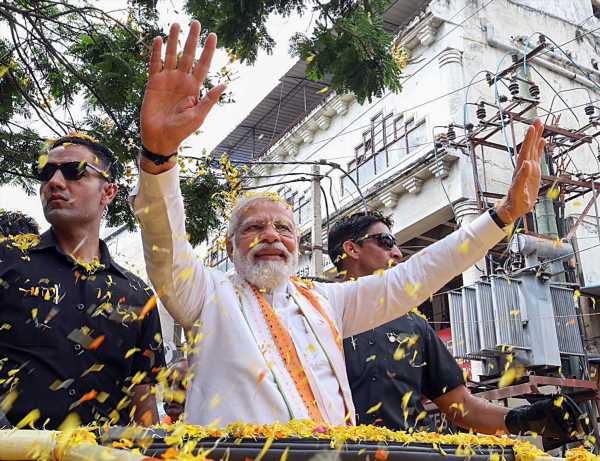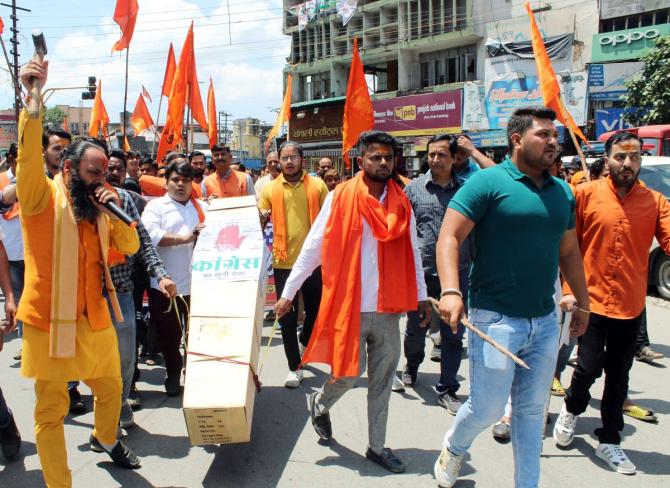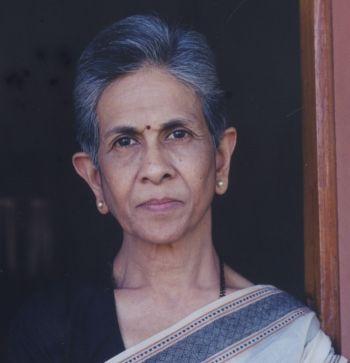‘Religion has divided our country like it never had done.’
‘I can’t remember a time of such focused hatred.’
Award-winning novelist Shashi Deshpande — a native of Karnataka and the legendary playwright Adya Rangacharya’s daughter — discusses the Karnataka election results with Rediff.com‘s Shobha Warrier.
It is said many people in India sighed in relief after the Karnataka election results were out. How was it for you?
Yes, indeed great relief. Democracy gives us the right to change governments which are not working well.
It is an important right and I think all governments need a shake up every 5 years. Otherwise, they get complacent and arrogant.
I am also very glad that we did not have a hung assembly which would have meant that whoever gets power begins it with corruption by ‘buying’ legislators.
How do you describe the last five years of the BJP rule in the state?
Not very pleasant. Too much focus on inessentials, like the hijab etc, too many unfulfilled promises.
Above all, I think that to set any community apart and make life difficult for them goes against the very tenets of our Constitution.
The Constitution gives us all equal rights. Any government in power must respect that.
Besides, one never felt that the people one had voted for were in charge. The orders came from elsewhere. How can you hold people accountable then?
Though Rahul Gandhi said it was a vote against the rule of hatred, many analysts were of the opinion that the results were against corruption and price rise. What do you say?
Yes, indeed people’s desire for change came out of many economic factors and, as I said, broken promises.
Corruption was visible and was equally visibly condoned.
I am happy that people made their displeasure clear.
As for Rahul Gandhi’s speaking of love, it may sound a bit weird in the kind of politics we have. But I am glad he is speaking of these things.
The hatred which was incited against a particular community is something that most Indians would not approve of.
Killing people on suspicion of eating beef was horrifying.
People in India have lived together for centuries, respecting the rights of others to live and worship the way they want, to eat what they want.
I have a great faith in the common woman/man. All that most people want is to live in peace, look after their families, educate their children and see them do well in life.
The events that dominated in the last few years in Karnataka were attacks against Muslims, and also bans like hijab ban, beef ban, azaan ban, etc. Can you recollect such turbulent and divisive times in Karnataka?
I must say I can’t remember a time of such focused hatred.
The hijab ban, for example, is so unnecessary. I personally dislike the hijab, but I have to concede the right of wearing it to others.
You were the second writer after Nayantara Sehgal to protest against the Sahitya Akademi by resigning from the Akademi General Council for not reacting strongly against the killing of Kannada writer Professor M M Kalburgi.
Now, Indian society is divided in the name of religion like never before. How dangerous has it become?
Yes, religion has divided our country like it never had done. I find this divide everywhere.
Many say they have stopped speaking of politics even with friends or family.
I was born when Gandhi, in the course of delivering India from the British, emphasised love and communal harmony.
I grew up in the Nehru era when education, rationalism and liberalism were part of the fibre of the country. How can I agree with hatred of others?
Right wing politics had become invincible in India in the last couple of years. Can people feel relieved after their defeat in Karnataka? Or, is it just a small setback for them?
One has to hope that this is a sign of better times to come. That governments will understand that dividing people on religious grounds is not an important issue.
So too dividing people because of caste or gender.
What all rulers should strive for is to give all citizens equality of status and opportunity.
Education, economic security, medical aid, environmental issues — these are far, far more important
Looking at the way Bangalore voted, do you think educated urban India has turned ‘right’?
I think the middle-class — some of it — has found something to cling to in the Hindutva campaign.
Now that many countries in the world are moving to right wing politics, are we going to witness more turbulent times?
That’s for sure. But I have hopes that India will never resort to violence. That we will bring about changes through elections.
For this, the right to dissent is very important.
Feature Presentation: Aslam Hunani/Rediff.com
Source: Read Full Article



